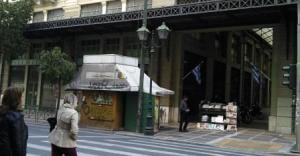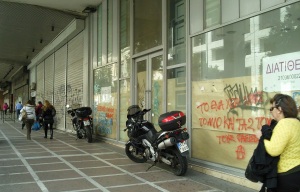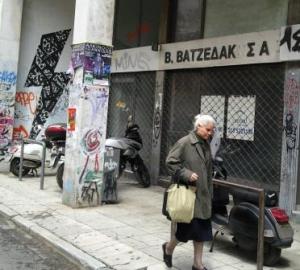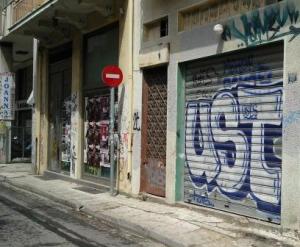http://hat4uk.wordpress.com/2013/04/20/crisis-athens-how-austerity-is-destroying-those-who-would-compete-with-multinational-power/
( Troika austerity is a siege of Greece )
 In the vicious circle that is hard-sold debt >> government overspending and embezzlement >> high-tax austerity >> economic collapse >> social misery >> drastic political change, the Far Right is getting 1 vote in 8, and the Radical Left looks like having the largest number of Deputies after the next election. Both have reached these positions from having been tiny (<4%) Parties three years ago.
In the vicious circle that is hard-sold debt >> government overspending and embezzlement >> high-tax austerity >> economic collapse >> social misery >> drastic political change, the Far Right is getting 1 vote in 8, and the Radical Left looks like having the largest number of Deputies after the next election. Both have reached these positions from having been tiny (<4%) Parties three years ago.
( Troika austerity is a siege of Greece )
CRISIS ATHENS: How austerity is destroying those who would compete with multinational power
These pictures are of a main Athenian thoroughfare, Stadiou. Think ‘Tottenham Court Road’, and then imagine every kiosk, stall, shop and indoor precinct closed down, every small shop empty and impossible to rent, and the once-bustling pavements half empty.
The Greek media that care run endless stories about starving children, lack of medication, old people dying because they cannot afford heating, and huge cuts in welfare relief.
These are all worthy topics for anyone still unclear about the catastrophic social effects of repayment-focused austerity in ClubMed. But if nobody buys in shops, eats in restaurants, sits in cafes or furnishes homes, businesses die in very short order.
In three short years, the banks of the world, the bureaucrats of the EU, and the Central Bank of Mario Draghi have wiped out Stadiou. Like the American South after the Civil War, it is a culture gone with the wind. All that remain are kids shooting up in the darkness of formerly thriving alleyways, and bill posters advertising things nobody has the money to buy.
Behind much of Athens’ attraction as a tourist centre lies another layer of self-sustaining business: the wholesale trade. This above any other is small family business, where honesty, trust and quality are the basis of commerce. It too has been decimated, as both domestic and tourist consumption of goods plummeted after 2010.
Everywhere are grills, graffiti, parked scooters, litter, and locks. Nowhere is any business being done. An entire sector of the City’s economy has been surgically removed. But nobody bothered to stitch up the open wound afterwards.
What you can see in Athens is the death of independent small business competition, the desecration of families that depended on it, and the reassuring certainty for the fat cats that in future, where once there was community liberty and self-reliance, there will before too long be imported global goods produced by multinational companies, cheap property ready to be torn down by developers, and the State enjoying control over a demoralised population totally dependent on it.
Some of the commercially naive bureaucrats and anthropologically ignorant political ‘leaders’ behind this policy represent yet more examples of what is wrong with European establishments throughout the continent. But for others – the Stateists, the neocon social engineers, the bourses, and the banks – all of this lost human energy is seen as the logical (and desirable) consequence of driving the Great Global God of Growth.
 In the vicious circle that is hard-sold debt >> government overspending and embezzlement >> high-tax austerity >> economic collapse >> social misery >> drastic political change, the Far Right is getting 1 vote in 8, and the Radical Left looks like having the largest number of Deputies after the next election. Both have reached these positions from having been tiny (<4%) Parties three years ago.
In the vicious circle that is hard-sold debt >> government overspending and embezzlement >> high-tax austerity >> economic collapse >> social misery >> drastic political change, the Far Right is getting 1 vote in 8, and the Radical Left looks like having the largest number of Deputies after the next election. Both have reached these positions from having been tiny (<4%) Parties three years ago.
But now at last, the focus is beginning to move away from corrupt old Parties and polemic ideologues towards a sort of patriotic pragmatism that no longer wants the euro. I spoke to several business people during my stay in Athens; most of them were not politically radical, but they recognised the need for a radical change to the economic model.
“The austerity programme is counter-productive because it destroys economic consumption in order to pay off State debt,” said a middle manager in a larger foreign-owned Greek furniture business, “this is like asking Berlin to pay off French municipal debt. It is resented, but more importantly it is sacrificing recovery to the lenders’ needs. The lenders may get their pound of flesh, but afterwards the patient is paraplegic.”
“The euro is the problem, no doubt,” said the co-owner of a medium-sized hitech business, “but if Greece were to go it alone and quit the euro, our business would be destroyed by a loss of credit confidence internationally. People like us want the euro to fail completely, so everyone will have to start again”.
His partner agreed. “The biggest problem we have right now is liquidity with which to expand, and credit so we can close deals with customers. Every week we work more and more to make less and less”.
“These fantasies of the Troika,” one CEO of a rapidly-growing political lobbying consultancy began, “they are all bullsh*t. The New Democracy and Pasok go along with it because they are weak and corrupt. But now things are far too serious for this to continue. The threats to Greek business and national sovereignty will get worse as the lenders’ demands get more and more crazy. We have to elect commercial people now who will gain public respect, and say “No” to the EU.”
Resentment towards the State sector and powerful bureaucrats is every bit as visceral as the disdain felt about the Troika.
Said one small entrepreneur, “These Troika people, so well dressed, such nice attache cases. They stay in the Hilton at Greece’s expense. None of them has any idea about business – only debt and repayment schedules. Now they insist that 150,000 civil servants be fired. Hah! That’ll be the day. Now they try to retire them off with fat pensions, but still they demand that the empty desks are filled with young recruits. They will cling onto our skin until we are all dead.”
There is a lot for the body politic to change here. The attitude to the euro, the weak resistance of Troika demands, fear of the bureaucrats, and the development of under-appreciated export businesses such as olive oil and wine. Nobody I met thinks the current crop of MPs is ever going to be capable of it. But there are endless scenarios in play as to how drastic change might come.
Of which, more later today.
http://www.keeptalkinggreece.com/2013/04/19/greek-finmin-speaks-of-lower-instincts/
( Greek Fin Min debases support of SYRIZA )
Greek FinMin speaks of “lower instincts”!?
Posted by keeptalkinggreece in Politics
“What is a lower instinct?” The question shot in my brain upon hearing Greek finance minister Yiannis Stournaras telling main-opposition party leader Alexis Tsipras of left-wing SYRIZA:
You are appealing to the lower instincts and tell the people we can stay int the euro without the memorandum. This is populism and lies.”
“What do you mean ‘lower instincts? Have you understood that you have drown into poverty 2/3 of the population, that hunger is spreading in Greece and that children go to school hungry?” Tsipras replied to Stournaras.
The clash between Stournaras and Tsipras in the Greek Parliament on Friday, when the SYRIZA-leader accused the finance minister “being a representative of the Troika.”
Unfortunately neither Tsipras nor we will ever know what exactly are ‘lower instincts’ are when it comes to economy as Stournaras refrained from giving an answer.
PS Did Stournaras mean that “people would get lust to turn into wild animals, with the strongest eating the weak one?” Or did he imply that the 1.3 million Greeks without job, without income and health insurance, those 20,000 without home are hiding some primordial innate behavior inside them that could break out one day?
http://www.keeptalkinggreece.com/2013/04/19/lucky-freezing-greeks-heating-oil-consumption-decreased-68-7-but-revenues-rose/
( " Lower instincts " class froze their asses off last winter )
Lucky freezing Greeks: heating oil consumption decreased 68.7%, but revenues rose
Why did we freeze all through the winter? Because the Greek finance ministry had raised the special consumption tax in heating oil, while the tax in natural gas was raised a year before. What did the ministry win from having us on cold show? It raised more revenues – more than the previous year where the consumption was higher and tax lower.
What did we win? Running noses, freezing feet and showers once a week. A collection of cozy pictures showing our seniors wrapped in blankets all day and night. Our merry-go-round kids running in the living room wearing parkas. Our housewives wearing woolen gloves except when standing at the kitchen sink. And husbands trying to make a happy face under the pressure of an icy blow in the wallet.
On the other hand, those blessed with a fireplace, enjoyed fuzzy-warm nights with friends grilling sausages and toasting bread. What if the next day, coach and comfort chairs would transmitting odors resembling to those of next corner grill diner? We had fun with grilled meat and red wine at a cost much lower than cooking on the stove – then electricity prices are not much better.
No matter how difficult the winter was, we, Greeks, are proud to have come through the winter without major losses. Grannies and grandpa’s survived it without heating and so did the kids. A wonderful training for next winter 
Official: Consumption dropped, revenues rose
Consumption of heating oil dropped 68.7 percent in the period from October 2012 to February 2013 compared with a year earlier, according to data released on Thursday by the Finance Ministry. Nevertheless the state’s revenues from tax on the fuel still rose.
”The major increase in the special consumption tax on the commodity that was brought in line with that of diesel in order to combat the illegal trading of heating oil for diesel led many consumers to seek alternative means of heating their homes this winter, which also happened to be among the mildest in living memory in Greece.Furthermore, the majority of Greeks had bought ample quantities of heating oil last April when plans for the tax hike from October 15, 2012 became known.In the first five months with the tax on heating oil on a par with that of diesel, consumption amounted to just 739 million liters, against 2,358.6 million liters in the period from October 2011 to February 2012.However, at the same time the increased consumption tax meant that revenues for the public purse grew from 141.5 million euros in winter 2011-12 to 244 million this year. (full details on heating oil consumption in ekathimerini)
While, the majority of us, did not use heating oil or natural gas due to the tax rise and our income decreases, the sunny-boys from Greek Finance Ministry justified the decreased consumption mainly with the ever-shining-sun in Greek regions: from south to the north, from east to west. Apparently 24 hours a day!
In the document accompanying the data sent to Parliament, Finance Minister Yannis Stournaras and his deputy Giorgos Mavraganis stated that “it is clear that in the current winter season there has been an increase in revenues from the special consumption tax on heating oil compared to the same period last year despite the reduction in consumption of the fuel, which was due to the reduced demand owing to weather conditions, to stocks and to its high retail price, but also due to the containment of smuggling.”
PS I do not need to mention that we are absolutely proud to have combated the illegal fuel trading by …freezing, right?
http://www.keeptalkinggreece.com/2013/04/19/growth-is-here-greek-govt-opens-job-vacancies-for-6-alternate-ministers/
( PM Samaras says " austerity for thee lower instinct class but not for me and my cronies " )
Growth is here! Greek Gov’t opens job vacancies for 6 alternate ministers
Posted by keeptalkinggreece in Politics
Growth arrived in Greece. Finally. After five years of recession. Growth is here to stay. To mark this joyful news. Prime minister Antonis Samaras opened seven job vacancies for high state positions. Published at the official government gazette are the positions for
six alternate ministers for Administrative Reform, Justice, Public Order, Tourism, Marine and Macedonia-Thrace.
immediately Greek media started to report that Samaras made the big difference: that is announcing in advance a government reshuffle.
However, Samaras’ aides dismissed “any government reshuffle” and thus before upcoming June. That is “before the Troika-program is implemented as agreed and before the summer assessment.” The country’s “international lenders should continue talking to the same people,” the sources from the prime ministry argued.
“The positions are in order to fill a legal vacuum,” Samaras’ aides told the media, hardly convincing anyone, though.
With the new positions the Greek cabinet will grow to 48 persons from 41 for the time being as there is plan to open a vacancy also for a deputy Education Minister.
Private Skai TV reported citing government sources that the “new positions were in agreement with the Troika, as all ministries had to have a common structure.”
It looks as if Samaras’ coalition government partners were taken by surprise. Sources from Socialist PASOK told media, “they heard about these vacancies from the press.” Democratic Left is still consulting on a reaction, I suppose.
I read somewhere that an alternate minister directly reports to the prime minister, while a deputy minister directly reports to the minister.
PS Should I put my bet on lack of confidence between the prime minister and some of the cabinet ministers? Or should I better try my luck and place my chip on filled-up state registers that will feed six to seven ministers (alternate or not), their staff as wells as their phone and electricity bills? Or see the whole expansion as a measure to combat unemployment among party friends and supporters?
Cyprus news.............
http://www.cyprus-mail.com/banks/cbc-releases-detailed-pimco-report-banks/20130420







